The Chatham Arts Council is investing in artists through our Meet This Artist series, introducing you to 12 Chatham County artists each year in a big way.
The fine folks at Hobbs Architects in downtown Pittsboro are powering our Meet This Artist series this year. Architecture is art, and the Hobbs crew values art in our community.
Take a look. Meet your very inspiring neighbors. Meet This Artist.
When you meet Erica Berry, singer and owner of Jammin Baby, you are immediately struck by her energy and melodic voice. At several points during the conversation, she will likely break out in song, and you find yourself blown away by her voice, which is beautifully soothing. It’s easy to understand her popularity with kids, helping them learn music and movement. Her work extends beyond her business and into volunteer work, to help the next generation of singers find their voice as she found hers. Read on to learn more about this talented singer and educator.
Tell me about yourself.
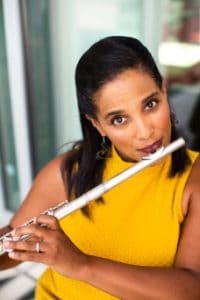 I was born in Berkeley, California. I’ve always loved music and art. As a young child, I participated in community theater, which my mom signed me up for. She was all about finding me free programs or scholarships because she was a single mom. I’m grateful to her for that.
I was born in Berkeley, California. I’ve always loved music and art. As a young child, I participated in community theater, which my mom signed me up for. She was all about finding me free programs or scholarships because she was a single mom. I’m grateful to her for that.
In elementary school, I played the flute and was part of a Gilbert and Sullivan troupe, which was a free program in Berkeley where fifth and sixth graders were in a theater troupe as part of their education. We toured, which included a performance at a Native American reservation. Going to that reservation had a huge impact on my life in terms of helping others and spreading joy through theater that way.
When I went to high school, I wanted to be part of the Young Musicians Program at UC Berkeley. I wanted to be in a school like the one in the movie “Fame.” I auditioned two times with my flute because I thought I was a flutist. They did not agree and did not let me in the first two times. So the third time I auditioned, I decided to sing. I never considered myself a singer, but I was always singing at home. I do not know what Dr. David Tigner saw in me when I sang for the audition, but his eyes lit up and said, “Now we’re talking!” So they let me into that program, which was a pivotal moment in my youth, because they paid for everything for you — summer camps, a professional coach, and classes. I never considered myself a singer until the Young Musicians Program.
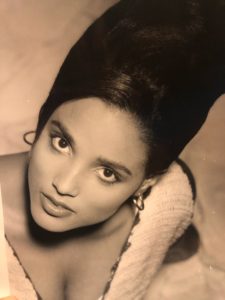 I became a classically trained musician. I spent my summers on the UC Berkeley campus in their music room. Some of my classmates turned out to be famous musicians. In fact, the award-winning playwright Eisa Davis, who is the niece of Angela Davis, used to accompany me on the piano. My teachers told me that they could write me a recommendation to get into Juilliard but my mom was against me going to a music-only school. She wasn’t against studying music; she was just against me going to a music-only school because she wanted me to be able to make money and support myself. So I went to Howard University, where I studied political science, with a minor in music.
I became a classically trained musician. I spent my summers on the UC Berkeley campus in their music room. Some of my classmates turned out to be famous musicians. In fact, the award-winning playwright Eisa Davis, who is the niece of Angela Davis, used to accompany me on the piano. My teachers told me that they could write me a recommendation to get into Juilliard but my mom was against me going to a music-only school. She wasn’t against studying music; she was just against me going to a music-only school because she wanted me to be able to make money and support myself. So I went to Howard University, where I studied political science, with a minor in music.
What kind of music did you do when you were at Howard?
I was in the university gospel choir. I remember one private coach saying that singing in a gospel choir is like smoking a cigarette in public. I’ll never forget her saying that to me. What she meant was that she thought I was wasting my talent and ruining my voice. I thought that was ridiculous. I told her that I’m going to do what I’m going to do. I like singing all kinds of music.
Tell me about your album. How did that come to be?
I went to law school after I graduated from Howard, but I still wanted to be a musician. You never lose that love for music, that love for the stage. So while I was in law school, I sang in jazz clubs at night. But after I graduated, I decided not to practice law yet. I wanted to be a famous singer.
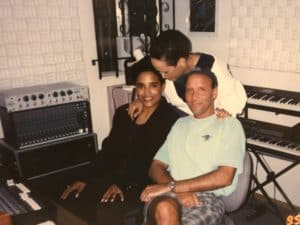 My husband and I were living in my grandfather’s building at the time. My grandfather told me that we could build a studio down in the basement. So we built a studio and started Positivity Records, which was our own independent label. We got a producer, Jon Bendich. He believed in me and he went in on it with his own money. His dad was a pretty famous producer who owned a huge studio. Jon was a percussionist and knew everybody. He co-produced my album and co-wrote all the songs with me. We had to shop the album back in the day — we didn’t have social media back then. You had to pay people to get your record played. It’s a lot easier now.
My husband and I were living in my grandfather’s building at the time. My grandfather told me that we could build a studio down in the basement. So we built a studio and started Positivity Records, which was our own independent label. We got a producer, Jon Bendich. He believed in me and he went in on it with his own money. His dad was a pretty famous producer who owned a huge studio. Jon was a percussionist and knew everybody. He co-produced my album and co-wrote all the songs with me. We had to shop the album back in the day — we didn’t have social media back then. You had to pay people to get your record played. It’s a lot easier now.
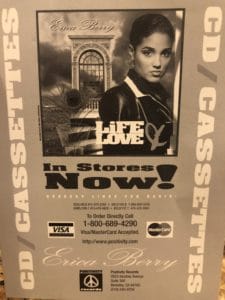 But then my husband and I decided we wanted to have kids. My husband was also tired of California so we moved to New Jersey. But right before we moved, we got an offer from a UK company to buy the rights to not only Positivity.com, but also to the album. So we sold the rights to the album for a nice little piece of change. The company bought it, revamped it, repackaged it, and put it on a compilation, which was a big deal back then because compilations were pretty popular. Then out of the blue, I get a notice that my song Believe, which I co-wrote with Jon Bendich, is a top 10 R&B hit in the UK. I started getting requests for interviews over in the UK, but at that point I wanted to have kids so I decided that I was ready to be a lawyer. I walked away from music.
But then my husband and I decided we wanted to have kids. My husband was also tired of California so we moved to New Jersey. But right before we moved, we got an offer from a UK company to buy the rights to not only Positivity.com, but also to the album. So we sold the rights to the album for a nice little piece of change. The company bought it, revamped it, repackaged it, and put it on a compilation, which was a big deal back then because compilations were pretty popular. Then out of the blue, I get a notice that my song Believe, which I co-wrote with Jon Bendich, is a top 10 R&B hit in the UK. I started getting requests for interviews over in the UK, but at that point I wanted to have kids so I decided that I was ready to be a lawyer. I walked away from music.
I started working at a law firm, and stayed there for six years. I got pregnant with twins, Lena and Simone, and delivered them as preemies, four months early. Simone passed away at 13 days old. We had to take special care of Lena to make sure she made it through, keeping her inside all winter. But we made it through. She’s now away at college.
During that winter when I was home with Lena, I sang a lot. The very first class I took with Lena was Music Together. I signed her up for every class you could do because they said it would help her with her development because preemie babies are sometimes delayed. When I was pregnant with my second child, Sophia, we decided to move down to North Carolina. That’s when Jammin Baby was born.
The first thing I did was start a mom’s group in my neighborhood. I asked them if they’d come to my music class for kids if I started it up and they all said they would. Jammin Baby started in my neighborhood clubhouse with one group of moms that I put together. They were all excited about it. They all came to the class, and it was packed. It was always sold out, so I started expanding. That’s how it started.
The curriculum is very culturally diverse. The music is not all kiddie music. It was kid-friendly music, but it still had the soul of some real good jazz. You can hear the musicianship.
Do you do any volunteer work in the music world?
I currently participate as a mentor for the NAACP ACT-SO program, which I competed in as a singer back when I was in high school. Kids from all over come and they compete in all types of things, like engineering, architecture, music, and classical dance. It’s like a huge Olympics. It had a real impact on me, in terms of seeing people from all over the country in the competition. I remember walking in with my banner on that had my state on it. Dr. Tigner spent his own money to come to New York and Baltimore with me when I made it to the finals.
I am more than happy to give back what has been given to me by my mentor, Dr. Tigner, may he rest in peace. I still remember his laugh and smile. He truly believed in my talent. It’s always good to have somebody who believes in your talent.
How do you help these young singers find their voice and prepare for competition?
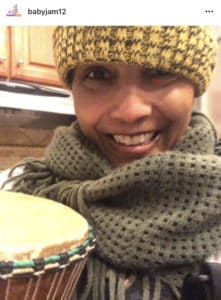 I tell them that you have to find your voice and then try it on, like you do in a clothing store. You sound your best when you can give a song your own passion. I want you to tell the story. I want it to be nice and clear. I want you to showcase the voice that you have. Choosing a song for a competition is hard because you may love a song, and you may love an artist, but that artist’s song may not be the song you need to sing for a competition. If you want to win, you have to sing the right song for you.
I tell them that you have to find your voice and then try it on, like you do in a clothing store. You sound your best when you can give a song your own passion. I want you to tell the story. I want it to be nice and clear. I want you to showcase the voice that you have. Choosing a song for a competition is hard because you may love a song, and you may love an artist, but that artist’s song may not be the song you need to sing for a competition. If you want to win, you have to sing the right song for you.
I also give them feedback on their posture, how they look, how they convey a song, eye contact, showmanship, etc. I was also a drama teacher at Woods Charter for four years. I actually created the drama program there — I really wanted them to have one so I created it. I taught drama for free for four years. They now have a full time drama teacher.
Who inspires you?
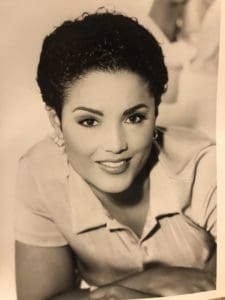 I liked the greats, like Stevie Wonder, Aretha Franklin, Otis Redding, Whitney Houston, and Patty LaBelle. They have passion in their souls. I also love the lyric writing of George Benson and the musicianship of all the jazz greats. Alicia Keys really gets it. Jill Scott is one of my favorites.
I liked the greats, like Stevie Wonder, Aretha Franklin, Otis Redding, Whitney Houston, and Patty LaBelle. They have passion in their souls. I also love the lyric writing of George Benson and the musicianship of all the jazz greats. Alicia Keys really gets it. Jill Scott is one of my favorites.
I was never great at singing big songs. I have a nice voice, but the big belting and all the riffs and runs like the way Whitney Houston sang, that was not my style. Even though I sang gospel, I would stay in the high classical part of the gospel and contribute that way. I just did me because if you try to copy somebody else, then you’re not finding your own voice. I was never actually satisfied with it because I would compare myself to them. And it’s never the same. You just have to be happy with your voice. Everybody’s got their place in the world and you just have to like find your own place.
How has COVID affected you and your Jammin Baby business?
Jammin Baby has been significantly reduced in terms of students because there are not a lot of young students whose parents want them to be engaged on Zoom. So my attendance went down, but I still have a core of about 30 families that stayed with me on Zoom. Pre-pandemic, I had over a hundred families. I’m now teaching half my classes outside, which can be challenging with the weather. I also increased my personal training business, B2Fit Club, to help make up the income.
Are either of your girls musically inclined?
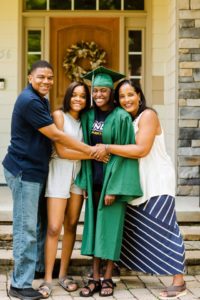 My younger daughter Sophia loves to sing. My older daughter Lena has a very deep voice, and she thinks she can’t sing, but it’s not that — it’s that she has a very low pitched voice so children’s songs never fit her voice. Sophia is very personable; I could see her coming back to singing. She sings all the time but she’s more of a math and science kid. But she did do theater for a long time. Unfortunately one day she just quit and told me not to sign her up for that again. She was really good at it, too. I was a little disappointed.
My younger daughter Sophia loves to sing. My older daughter Lena has a very deep voice, and she thinks she can’t sing, but it’s not that — it’s that she has a very low pitched voice so children’s songs never fit her voice. Sophia is very personable; I could see her coming back to singing. She sings all the time but she’s more of a math and science kid. But she did do theater for a long time. Unfortunately one day she just quit and told me not to sign her up for that again. She was really good at it, too. I was a little disappointed.
What do you see for yourself in the future with your music?
I’ll never stop singing. I love music. I don’t know, though — maybe I’ll get involved in singing projects, or maybe something with a group. You never know. Once the kids are out of the house, when I don’t have to drive anybody anywhere, I may find something new to do. I always say I’ll always make music in some kind of way. Even with my fitness classes, I always have a theme and a specific playlist that binds it all together. I can’t get rid of that show business. It truly feeds my soul.

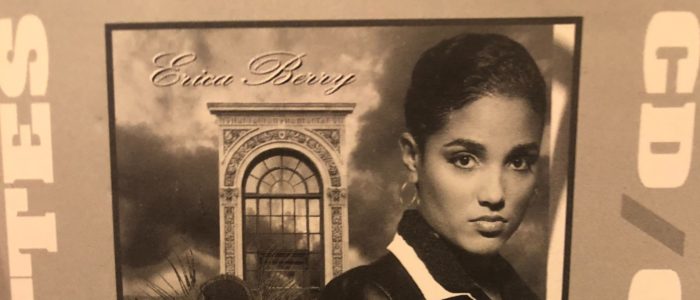


What a wonderful article this is! Congratulations Erica!